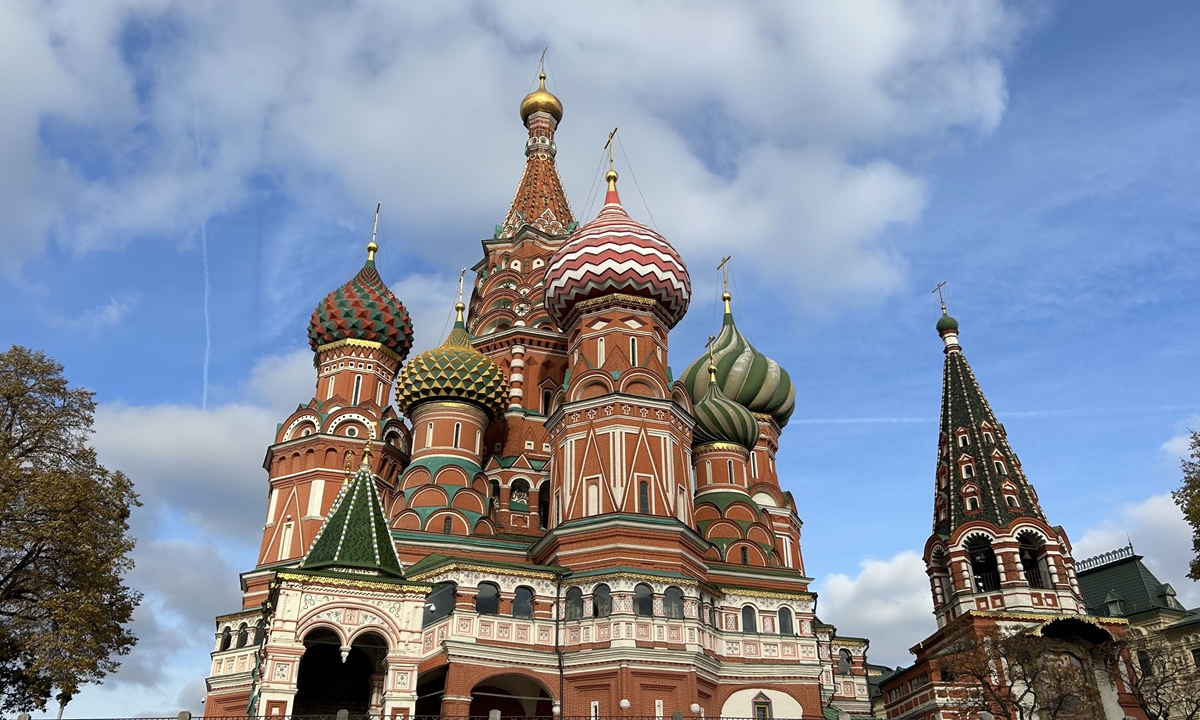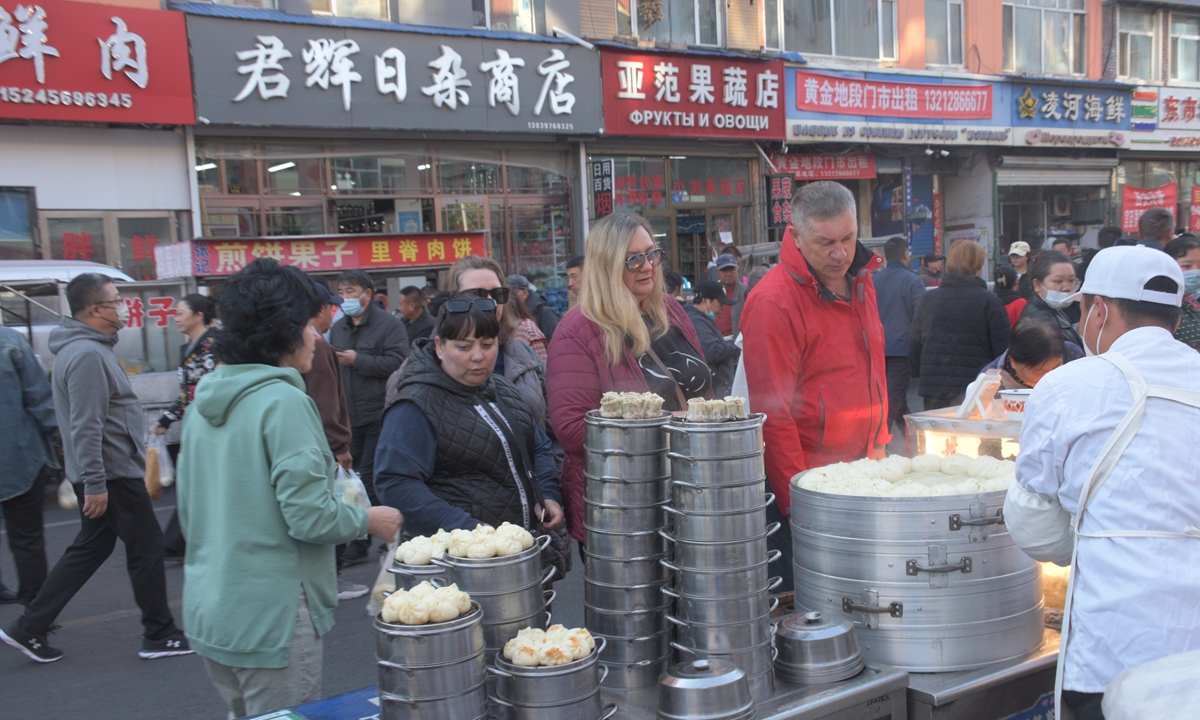
Saint Basil's Cathedral in Moscow, Russia Photo: Zhang Han/GT
More frequently the China-Russia relationship is understood through a political and strategic lens. But from Russians who enjoy breakfast and morning fairs at the Chinese border city of Heihe, to Chinese tourists who are impressed by western Russian cities' combination of European charm with Soviet legacy, bilateral people-to-people exchanges play a key role in enhanced mutual understanding and deepened friendship.
The recent influx of Russian visitors to Heihe, Northeast China's Heilongjiang Province, came as a result of a mutual visa exemption scheme, a convenience policy which was suspended during the COVID-19 pandemic and resumed in September.
Per media reports and vlogs uploaded online, many Russian visitors are particularly fond of Chinese morning snacks, and enjoy shopping for groceries, clothing items and small trinkets at local fairs. To ease communication, local vendors have put up bilingual signs in Chinese and Russian to attract customers.
Liu Hui, who runs a small travel agency in Heihe, said that he has received an increasing number of inquiries on trips to Russia in recent weeks, boosted by the visa-free policy.
Basically one can hand in their passport and other requisite documents, and be ready to go the next day, Liu said. "It takes just 10 minutes or so by boat and you can step on Russian lands."
Chinese tourists are interested not only in Russia's border cities such as Blagoveshchensk, but also "far western" big cities such as Moscow and Saint Petersburg.
The Global Times reporter also learned that the content about "aurora chasing" trips to Russia's Murmansk is incredibly popular on lifestyle platform Xiaohongshu in China, garnering numerous likes.
Unique experience
At Red Square, the landmark of Russia's capital Moscow, Wang Jia, a Chinese tourist from East China's Shandong Province, excitedly told the reporter about the city's friendly locals, its incredibly scenic spots, and her trip's overall convenience.
Upon arrival at the airport, Wang and her three friends had no trouble navigating through customs thanks to Chinese language signs. People at the airport also happily offered directions to city transportation.
Despite finding Moscow's web-like subway system confusing, Wang and her friends could still easily access it by swiping their Chinese bank-issued UnionPay cards. And they can always get help from locals.
Once at a station in northern Moscow, a young man, with limited English, kindly guided Wang's group to the restaurant they were looking for and said "we are friends" in Chinese before leaving.
"That is the moment the sound bilateral relationship becomes vivid and personal for me," Wang told the Global Times.

Russian visitors choose Chinese morning snacks in Heihe, Northeast China's Heilongjiang Province. Photo: VCG
Wrapped in warm winter clothes, Wang and her friends posed for pictures in front of the well decorated, colorful Saint Basil's Cathedral, paid tributes to Lenin's Mausoleum and Karl Marx's statue, and shopped at the "Gum" mall - Soviet era's national department store.
Wang, who is an art lover, also expressed her enthusiasm for galleries and museums in Moscow, as well as the iconic Winter Palace in Saint Petersburg, the official residence of imperial house of the Romanovs.
Wang's friend Liu was more interested in the palace's history of being stormed in 1917, a symbol of the revolution, which subsequently had a profound impact on Chinese modern history.
Other Chinese tourists told the Global Times that they were impressed by the tall commune buildings in Soviet era, which reminded them of living in a state-owned company complex in childhood.
The European sentiments and the shared socialist past are two of the most common points of attraction offered by Russia to Chinese tourists.
Easy trip Wang and her friends did not join an agency-run tour group, and therefore did not benefit from the visa exemption scheme. But the e-visa was easy to apply for and did not require an in-person visit to the Russian Embassy. The visas, issued in three to five days, were "quite efficient" to get.
Before departure, Wang, like many other tourists, was afraid that the trip would not be easy considering they would not be able to use international credit or debit cards due to the sanction imposed by SWIFT. It was also quite difficult to exchange enough ruble in cash from a Chinese bank for a week-long trip.
However, the group managed to connect a Russian local car-hailing app to a Chinese card, and withdrew money from local bank ATMs with their Chinese cards at real-time rates.
In bigger malls or stores close to tourist sites, as well as the metro system, Chinese cards also work.
"Chinese [tourists] must have left them with the impression of buying a lot; the souvenir stores always offer UnionPay and WeChat," Liu said jokingly.
In several shops on the six-century-old Arbat Street, the salespersons can speak quite fluent Chinese, the Global Times found.
A Chinese student, who studies at Moscow State University, told the Global Times via Xiaohongshu that during the early October Chinese National Day holidays, Chinese tourists made up a large part of the crowds in Red Square and in the State Historical Museum.
The student works as a part-time guide for Chinese tourists and businesspeople who are in need of assistance with language translation, hotel and performance tickets booking, banking or other affairs.
Interest in his unique set of services has skyrocketed in Moscow since September. The number, however, dropped after the holidays perhaps because Moscow is getting too cold for Chinese travelers but inquires about Murmansk trips from December to February have increased, the student said.
"I felt that along with the development of bilateral relations at the official level, we students and the tourists play a role of complementing the picture of exchanges with a human touch," Zhang said.
"When I make friends with my classmates, when a Chinese national receives a warm reception and has an unforgettable experience here, we do not really think about strategic interests or bilateral trade between the two countries; yet every intimate personal bonds consolidate the relationship as a whole," he said.





